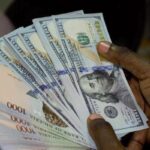The Nigerian naira plummeted to a historic low of N1,534 against the dollar on Monday, marking a downturn from its previous closing rate.
According to data from FMDQ Exchange, the national currency saw a 3.93% decline, shedding N58 compared to the end of last week.
Join our WhatsApp ChannelREAD ALSO: Nigeria’s Economic Independence Struggle: The Foreign Telecom Giants, Naira’s Dilemma
“This is a concerning development for our economy,” remarked economic analyst Dr. Adewale Ogunleye. “Such volatility undermines investor confidence and exacerbates inflationary pressures.”
The situation has been exacerbated by changes in the calculation methodology for the official exchange rate, which has led to a depreciation trend.
Since the revision by FMDQ, the naira has steadily weakened against the dollar, moving from over 900/dollar to over 1,400/dollar.
In response to the crisis, the Central Bank of Nigeria (CBN) has taken measures to stabilize the market, including ordering banks to sell excess dollars. However, dollar sales by banks dropped by over 56% from the peak, indicating challenges in implementation.
“We need a more robust strategy to address this forex crisis,” urged economic expert Prof. Aisha Mohammed. “The current measures seem insufficient to stem the tide.”
Meanwhile, Bureau De Change operators in Lagos are grappling with the currency turmoil, with buying rates hovering around N1,480-N1,490 and selling rates at N1,500-N1,503.
“We’re facing tough decisions due to the fluctuating rates,” lamented Mallam Muhammed, a BDC operator in Yaba. “It’s becoming increasingly challenging to maintain profit margins.”
With the naira continuing its downward spiral, concerns mount over the broader impact on Nigeria’s economy and the livelihoods of its citizens.
As the government and financial institutions scramble for solutions, the future remains uncertain for the country’s currency stability.


















Follow Us